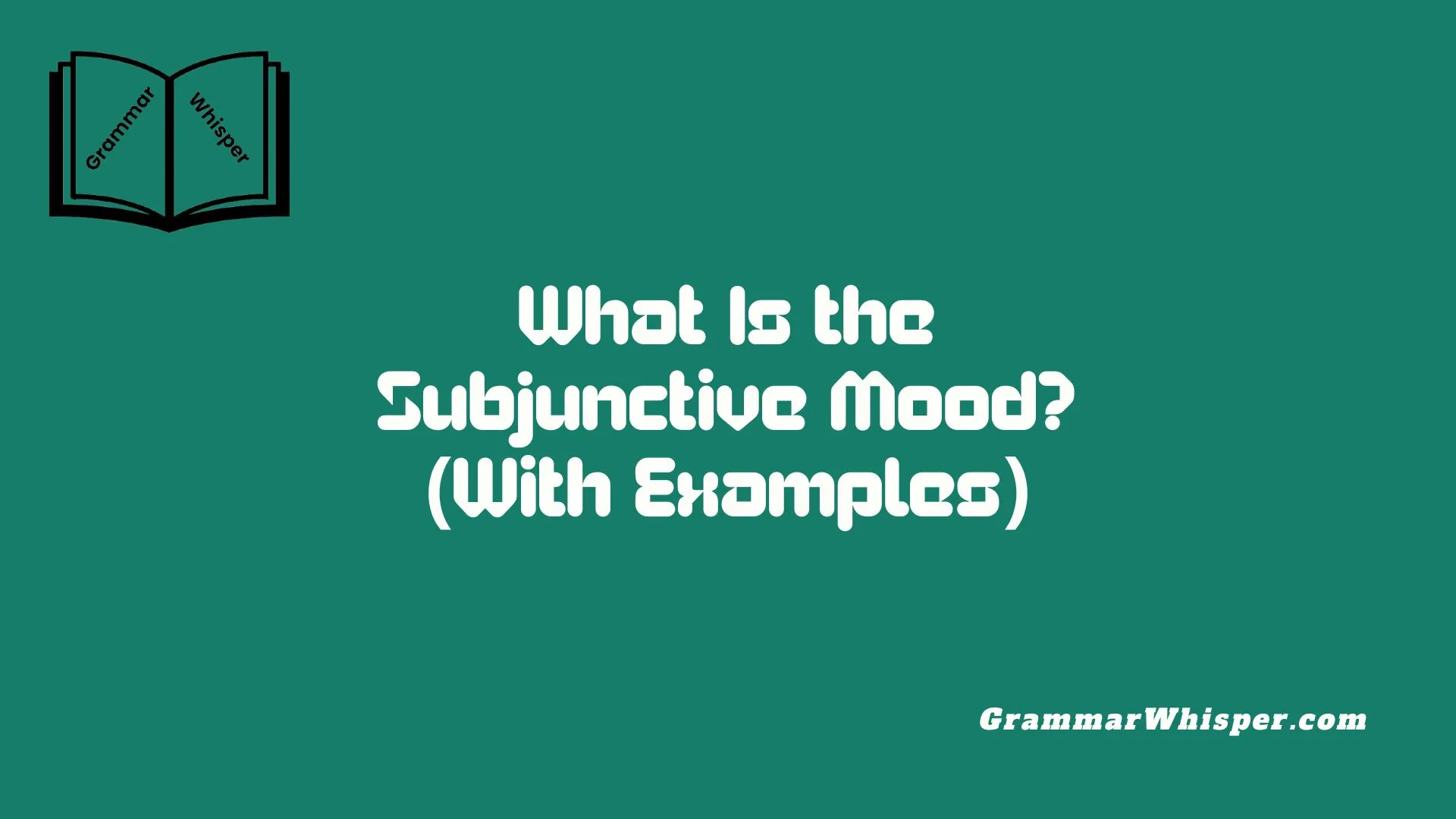Many English learners – and even fluent speakers – use the subjunctive without realizing it. You’ve likely heard sentences like “I wish I were taller” or “She suggested that he be on time.” These phrases seem simple, but they reveal the unique role of this mood. Unlike the indicative, which describes reality, or the imperative, which gives commands, the subjunctive handles hypotheticals, wishes, and necessities. It shows how we express ideas that aren’t quite real, at least not yet. And even though it often sits in plain sight, the subjunctive follows its own subtle grammar path that makes a big difference.
What’s powerful is how the subtlety of the subjunctive can actually elevate your formal writing. When you use it well, your words gain polish and depth. It helps improve clarity and gives your tone more control in nuanced contexts. I’ve used it in professional settings – especially in documents where precision matters – and seen the results firsthand. Knowing when to avoid the indicative in favor of the subjunctive adds authority and accuracy. It’s a skill that, once mastered, makes your writing more impactful, more precise, and ultimately more human.
Understanding the Subjunctive Mood in English Grammar
Mood in grammar isn’t about tone of voice; it signals how the speaker views what they say. In English, we mainly use three moods:
- Indicative: Statements about facts or opinions (“She writes every day.”)
- Imperative: Direct commands or requests (“Write that now.”)
- Subjunctive: Situations that are doubtful, desired, or imaginary
The subjunctive mood steps in when we talk about things that aren’t real yet – like hopes, necessity, or hypothetical scenarios. It’s more common in formal and written English, though you encounter it often in idioms and test questions.
When and How to Use the Present Subjunctive
The present subjunctive uses the base form of a verb, regardless of the subject. You’ll often see it after certain trigger words in a “that”-clause:
- verbs: recommend, insist, demand, suggest
- adjectives: important, necessary, vital
Examples:
“I suggest that she be present.”
“They demand that he leave immediately.”
Notice how we don’t say “he leaves” or “she is” – that would be indicative. The base form signals uncertainty or obligation instead of a fact.
The Role of the Present Subjunctive in Expressing Wishes and Demands
Often, English speakers use the subjunctive for strong emotions:
- Wishes: “I wish that he were here.”
- Demands: “The teacher insists that the homework be done.”
- Proposals: “She proposed that we meet tomorrow.”
This mood adds formality and clarity to situations where something should happen rather than fictionally does happen. It separates pure desire or necessity from a simple statement of fact.
Identifying the Present Subjunctive in Sentences
Spotting subjunctive sentences gets easier if you listen for:
- Trigger verbs/adjectives + “that”
- Base verb form with no “s” for third person
- Tense consistency (no -ed or -s)
Correct vs. incorrect:
| Sentence | Mood | Corrected |
| “She insists that he goes” | Indicative | “She insists that he go.” |
| “They recommend that I am” | Indicative | “They recommend that I be.” |
To test your understanding, replace the verb. If the base form feels right, it’s subjunctive.
Creating Sentences with Present Subjunctive Verbs
Practice builds mastery. Use these tips:
- Write sentences with recommend, insist, suggest
- Try expressing feelings like important or essential
- Use verbs like be, go, do, arrive in base form
- Mix in passive voice when needed (“be done,” “be chosen”)
Examples:
- “I suggest that he arrive early.”
- “It’s vital that she do the research thoroughly.”
- “They asked that the report be submitted by Monday.”
Exploring the Past Subjunctive and Its Uses
The past subjunctive shows up in hypotheticals and wishes. Often, we use “were” for all subjects:
- “If I were king, things would be different.”
- “She acted as if she were invisible.”
It’s a relic of older grammar, but it remains alive in set expressions and formal writing. Unlike “was,” which is indicative, “were” here tells us we’re talking about something purely imagined.
Distinguishing Between Subjunctive and Indicative Moods
Incorrect use can change meaning:
- Indicative: “He is my friend.” (fact)
- Subjunctive: “It’s essential that he be my friend.” (necessity)
Use this table to compare:
| Mood | Example Statement |
| Indicative | “She is the best choice.” |
| Subjunctive | “It’s critical that she be present.” |
Seeing sentences side by side helps you sense the shift in meaning. Mistakes here can reduce precision in polished writing.
Common Phrases and Expressions That Use the Subjunctive Mood
Some English idioms still thrive in the subjunctive:
- God bless you.
- Heaven forbid.
- If it please the court…
- Be that as it may.
These phrases survive because they express strong wishes or legal/formal stance. They remind us that the subjunctive isn’t dead – it lives on in cultural and legal contexts.
Modern Relevance: Is the Subjunctive Disappearing?
Many writers assume subjunctive usage is outdated. However:
- American English still retains subjunctive in formal writing and tested grammar.
- British English often replaces subjunctive with modal auxiliaries (e.g., should).
- According to the Oxford English Corpus, the present subjunctive appears in 2–3% of modern formal essays.
👌 Bottom line: You should learn it because standardized tests and formal writing still expect it.
Real-World Examples: Annotated Text Analysis
Let’s look at real examples and break them down:
“The committee insists that she be present at the hearing.”
- Insists = trigger
- that = clause marker
- she be = subjunctive (present base form)
“If he were in charge, this wouldn’t happen.”
- If = hypothetical
- were = past subjunctive (though subject is “he”)
These sentences contrast with:
“He is in charge.” (Indicative fact) “She was present.” (Simple past)
Common Pitfalls and How to Avoid Them
Even native speakers slip up:
- Mistake: “She demands that he goes.” Fix: “She demands that he go.”
- Mistake: “I wish I was smarter.” Fix: “I wish I were smarter.”
✅ Quick self-check:
- Look for trigger words like suggest, require, important
- Ensure verb stays in base form or were, not -s or was
- Read sentence aloud – if it sounds off, it probably is
Quick Reference Table: Common Triggers and Mood Use
| Trigger | Expected Mood | Example |
| recommend | Present Subjunctive | I recommend that she be early. |
| demand | Present Subjunctive | He demands that they attend. |
| essential | Present Subjunctive | It’s essential that you be present. |
| wish | Past Subjunctive | I wish I were more confident. |
| if (hypothetical) | Past Subjunctive | If I were rich, I’d travel more. |
Strategies to Master the Subjunctive Mood
- List trigger words: draft sentences using recommend, suggest, demand
- Convert real phrases: e.g., “She is happy,” → “I suggest that she be happy”
- Read formal writing: editorial essays, legal documents
- Use grammar tools: most editors flag incorrect subjunctive forms
Final Thoughts
Understanding the subjunctive mood in English isn’t just about mastering an obscure grammar rule – it’s about recognizing tone, intention, and clarity in communication. Whether you’re expressing a wish, suggesting an action, or describing a hypothetical situation, knowing how and when to use the subjunctive helps your writing stand out as precise and professional.
While it might feel unfamiliar at first, the subjunctive mood plays a subtle but important role in both spoken and written English – especially in formal settings, academic writing, legal language, and even fiction. Instead of avoiding it, embrace it as a tool. The more you practice, the more naturally it will become part of your everyday writing.
If you ever wonder “Is this sentence subjunctive or not?”, go back to the core triggers – wishes, demands, hypotheticals, and necessities – and you’ll rarely go wrong. Use it confidently, and you’ll not only sound more polished but more precise.
FAQs
What is the subjunctive mood used for?
It expresses wishes, necessities, hypotheticals, and formal demands – situations not based on fact.
Do modern English speakers still use the subjunctive?
Yes, especially in formal writing, legal contexts, and academic settings – American English favors it more than British varieties.
Is it correct to say “I wish I was”?
It’s common in informal speech, but “I wish I were” is grammatically precise and preferred in formal writing.
How can I remember when to use subjunctive?
Listen for trigger words like suggest, demand, essential. Use the base form of verbs and “were” for past situations.
Does the subjunctive only affect verbs?
Yes – it specifically changes the verb form to reflect mood, not tense or agreement.











